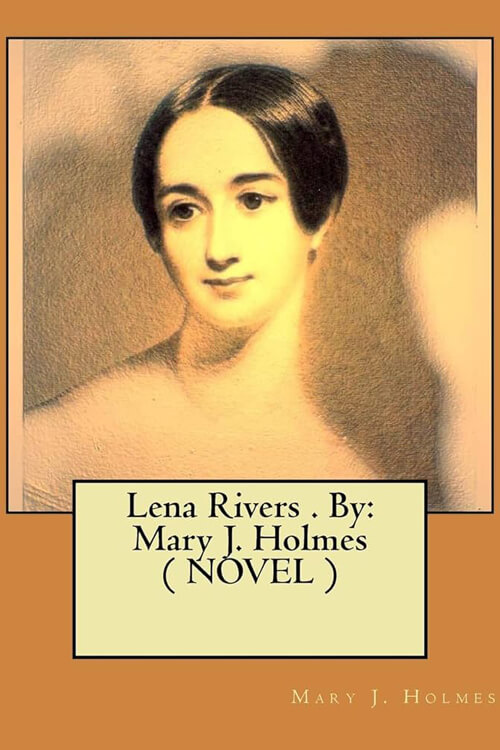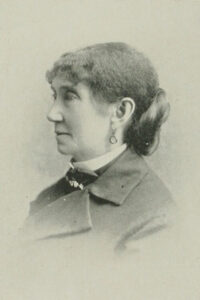
‘Lena Rivers
For many days the storm continued. Highways were blocked up, while roads less frequented were rendered wholly impassable. The oldest inhabitants of Oakland had “never seen the like before,” and they shook their gray heads ominously as over and down the New England mountains the howling wind swept furiously, now shrieking exultingly as one by one the huge forest trees bent before its power, and again dying away in a low, sad wail, as it shook the casement of some low-roofed cottage, where the blazing fire, “high piled upon the hearth,” danced merrily to the sound of the storm-wind, and then, whirling in fantastic circles, disappeared up the broad-mouthed chimney.
For nearly a week there was scarcely a sign of life in the streets of Oakland, but at the end of that time the storm abated, and the December sun, emerging from its dark hiding place, once more looked smilingly down upon the white, untrodden snow, which covered the earth for miles and miles around. Rapidly the roads were broken; paths were made on the narrow sidewalk, and then the villagers bethought themselves of their mountain neighbors, who might perchance have suffered from the severity of the storm. Far up the mountainside in an old yellow farmhouse, which had withstood the blasts of many a winter, lived Grandfather and Grandmother Nichols, as they were familiarly called, and ere the sun-setting, arrangements were made for visiting them.
Oakland was a small rural village, nestled among rocky hills, where the word fashion was seldom heard, and where many of the primitive customs of our forefathers still prevailed. Consequently, neither the buxom maidens nor the hale old matrons, felt in the least disgraced as they piled promiscuously upon the four-ox sled, which ere long was moving slowly through the mammoth drifts which lay upon the mountain road. As they drew near the farmhouse, they noticed that the blue paper curtains which shaded the windows of Grandma Nichols’ “spare room,” were rolled up, while the faint glimmer of a tallow candle within, indicated that the room possessed an occupant. Who could it be? Possibly it was John, the proud man, who lived in Kentucky, and who, to please his wealthy bride exchanged the plebeian name of Nichols, for that of Livingstone, which his high-born lady fancied was more aristocratic in its sounding!
“And if it be John,” said the passengers of the ox sled, with whom that gentleman was no great favorite, “if it be John, we’ll take ourselves home as fast as ever we can.”
Read or download Book
Mary Jane Holmes
Mary Jane Holmes (April 5, 1825 – October 6, 1907) was an American author who published 39 novels, as well as short stories. Her first novel sold 250,000 copies; and she had total sales of 2 million books in her lifetime, second only to Harriet Beecher Stowe. Her books included: “Tempest and Sunshine” (1854), “English Orphans” (1855), “Homestead on the Hillside” (1855), “Lena Rivers” (1856), “Meadow Brook” (1857), “Dora Deane” (1858), “Cousin Maude” (1860), “Marian Gray” 186^, “Hugh Worthington” (1864), “Cameron Vide” (1867). “Rose Mather” (1868), “Ethelyn’s Mistake” (1869), “Edna Browning” (1872), “Mildred” (1877), “Forest House” (1879), “Daisy Thornton,” “Queenie Hetherton” (1883), “Christmas Stories” (1884), “Bessie’s Fortune” (1885). “Gretchen” (1887), “Marguerite” (1891).
Portraying domestic life in small-town and rural settings, she examined gender relationships, as well as those of class and race. She also dealt with slavery and the American Civil War with a strong sense of moral justice. Since the late 20th century, she has received fresh recognition and reappraisal, although her popular work was excluded from most 19th-century literary histories.
Early life and education
Mary Jane Hawes was born in Brookfield, Massachusetts in 1825, the fifth of Fanny (Olds) and Preston Hawes’ nine children. The household was economically modest, but the parents encouraged intellectual endeavor. She may also have been influenced by her uncle, Rev. Joel Hawes (1789–1867), for many years minister at the First Congregational Church in Hartford, Connecticut, and known for his published sermons and other writings. Preston Hawes died when Mary Jane was 12 and she started teaching school at 13. Interested in writing from an early age, she published her first story at 15.
Death and legacy
Holmes died in 1907, at the age of 82, in Brockport. Her obituary was published a few days later in the Nation, reflecting her stature. Long excluded from literary histories of the nineteenth century written by men, the author was reappraised by scholars in the late 20th and early 21st century, who recognized her achievements and the value of her work.






